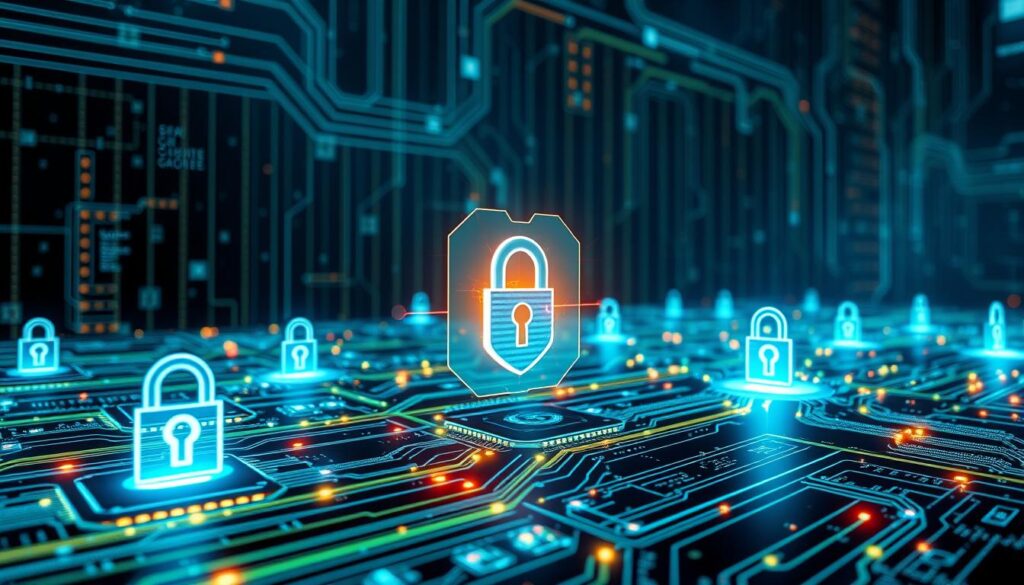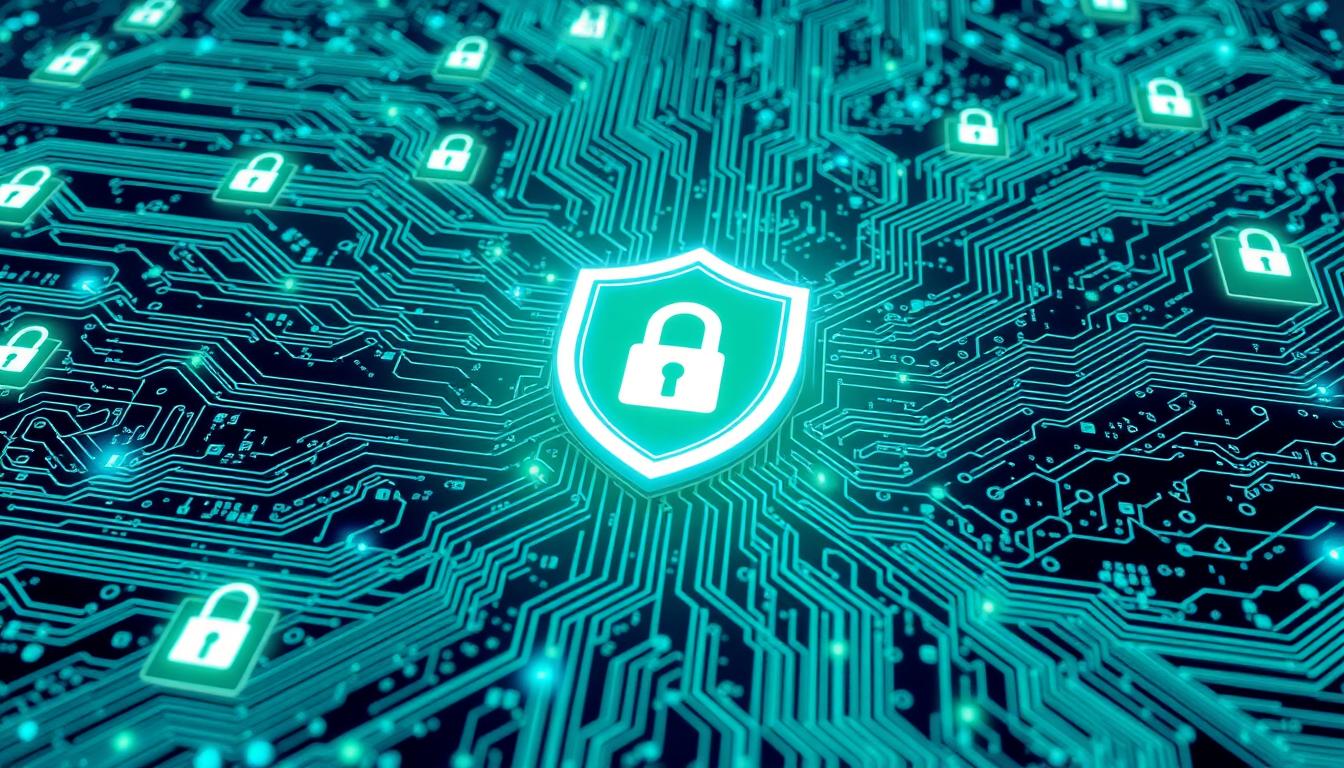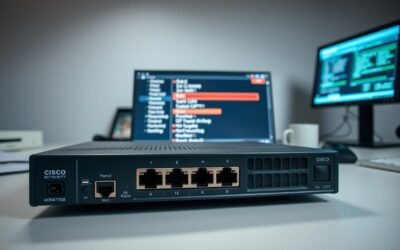Did you know that 94% of malware is spread through email? This makes cybersecurity very important for companies. Learning about CCNA Network Security Enhancements is key to making your network safer. This guide will show you how to protect your network from today’s threats.
It’s vital to have strong network security. With attacks getting more complex, CCNA security principles are essential. They help keep your data safe and your systems working right. This article explains why CCNA is important for learning cybersecurity. It’s good for your job and your company.
Understanding CCNA Network Security Enhancements
Learning about CCNA Security is key for those interested in network security. It’s a part of Cisco’s certification that focuses on protecting networks. With cyber threats getting worse, knowing how to keep data and systems safe is essential.
What is CCNA Security?
CCNA Security deals with network security basics, tools, and settings. It’s about fighting data breaches, which happen every 39 seconds on average. You need a CCENT or a CCNA Routing and Switching to start. The exam covers security concepts, VPNs, and intrusion prevention.
Importance of Network Security in Today’s Environment
The IT world faces more cyber threats than ever. With digital infrastructures growing, strong network security is more important than ever. CCNA training helps protect against threats. Security pros with certifications can earn up to $120,000 a year.
Overview of the CCNA Certification
The CCNA is a starting point for IT careers, with no need for prior experience. It includes 15% of its topics on security, like access control and passwords. This knowledge helps in setting up strong security measures.
| Key Topics | Description |
|---|---|
| Security Concepts | Fundamental principles guiding network protection |
| Access Control | Strategies for managing user permissions and securing networks |
| VPN Technologies | Methods for secure remote access and data transmission |
| Intrusion Prevention | Systems designed to detect and prevent attacks in real time |
| Recertification | Pathways available to maintain certification validity every three years |
Key Principles of Network Security
Network security is key to keeping our digital world safe. Knowing the basics can make a big difference. Two main frameworks are the CIA Triad and the AAA framework. Each is important for strong network security.
Confidentiality, Integrity, and Availability (CIA Triad)
The CIA Triad has three main goals for cybersecurity:
- Confidentiality keeps sensitive info safe from those who shouldn’t see it.
- Integrity makes sure data stays correct and unchanged.
- Availability lets users get to info and resources when they need to.
These goals help create a solid security plan. The CIA Triad is a key part of keeping your network safe.
Authentication, Authorization, and Accounting (AAA)
The AAA framework has three key parts for security:
- Authentication checks who users are before they can get into a network.
- Authorization decides what users can do based on their role.
- Accounting keeps track of what users do and what resources they use.
This framework helps manage who can do what on your network. It’s vital for keeping your network safe from threats.

CCNA Network Security Enhancements
Improving your network security with CCNA Network Security Enhancements means using many strategies and tools. It’s key to focus on secure access solutions for strong cybersecurity. This includes Network Access Control (NAC) to make sure only approved devices can connect.
Implementing Secure Access Solutions
Adding secure access solutions helps stop threats early. Access control helps manage device connections well. Following network security best practices lets you block non-compliant devices.
Utilizing VPNs and Firewall Technologies
VPNs and firewalls boost your network’s defense. VPNs encrypt data, keeping it safe from hackers. Firewalls block bad traffic, protecting your network from threats.
Intrusion Prevention Systems (IPS) in Your Network
Using Intrusion Prevention Systems (IPS) is key for network security. IPS watches network traffic and stops threats. Knowing how to use IPS improves your network’s security. CCNA training labs help you practice and get better at security.

| Feature | Description |
|---|---|
| Course Length | 5 days |
| Target Audience | Network security specialists, security administrators, network security support engineers |
| Key Technologies | NAC, VPNs, Firewalls, IPS |
| Recommended Prerequisites | Familiarity with basic networking and Cisco IOS features |
| Hands-On Labs | Vital for practical skill development and retention |
| Certification Exam Cost | CCNA Security 210-260 IINS: $250 |
| Practical Skills Developed | Configuring and securing network devices, troubleshooting |
Combining secure access, VPNs, firewalls, and IPS makes a strong CCNA Network Security plan.
Best Practices for CCNA Exam Preparation
To prepare for the CCNA exam, you need a mix of theory and practice. Good study resources are key. Official guides, like the “CCNA Security 210-260 Official Cert Guide,” are great for learning the exam content. Online courses also help with their videos and interactive parts.
Effective Study Resources and Strategies
Using different study tools can help you get your CCNA. Here are some tips:
- Study guides help you follow the exam syllabus.
- Online platforms, like Cisco’s Networking Academy or Udemy, offer courses for all learning styles.
- Practice exams let you get used to the test format.
Hands-On Practice Techniques
Practical experience is vital for CCNA training. It helps you understand networking better. Try these methods:
- Use tools like Cisco Packet Tracer or GNS3 for simulations.
- Set up a home lab with Cisco gear for real-world practice.
- Do labs that mimic real-world scenarios to improve your problem-solving.
Joining Study Groups and Online Communities
Being part of study groups or forums can really help. Here’s why:
- Sharing tips and resources with others can broaden your knowledge.
- Staying in touch with the latest trends through discussions.
- Learning together can give you support and motivation.
By following these tips, you can get the knowledge and skills needed for CCNA. Make sure to study all the exam areas well. This will help you cover the wide range of CCNA topics.
| CCNA Exam Domain | Percentage of Exam |
|---|---|
| Network Fundamentals | 20% |
| Network Access | 20% |
| IP Connectivity | 25% |
| IP Services | 10% |
| Security Fundamentals | 15% |
| Automation and Programmability | 10% |
Conclusion
Mastering CCNA Network Security Enhancements is key in today’s world. It helps you understand network security CCNA basics. This knowledge boosts your defense against new threats.
Getting the CCNA certification gives you a solid networking foundation. It also leads to more advanced IT security roles.
Keep learning and practicing to grow in your career. CCNA holders often find better jobs and earn more. The skills you learn from CCNA can lead to even bigger opportunities.
In a world where 80% of companies focus on network security, your CCNA skills are valuable. They help you protect your organization’s network. By always improving your skills, you’ll stay ahead and help keep networks safe.
Source Links
- CCNA Security 210-260 Official Cert Guide Premium Edition and Practice Test
- CCNA Security 210-260 Certification Guide | Cloud & Networking | eBook
- CCNA Security : From Basic Networking To Security Expertise – ITU Online IT Training
- CCNA certification prep: Security fundamentals
- What’s the Difference Between CCNA and CCNA Security?
- 6 Network Security Protocols You Should Know
- cisco Ccna Security – Common Security Principles
- Foundation Topics > Security Principles
- Cisco CCNA Security: A Deep Dive Into Network Security Expertise – MyComputerCareer
- Implementing Cisco Network Security (IINS 210-260)
- What was the Cisco CCNA Security Cert? + Alternatives
- Ace the 2023 CCNA Exam: Your Ultimate Guide to Success
- Tips to Pass the CCNA Certification Exam
- Impact of CCNA and CISSP on IT Security Careers – NetSecCloud
- No title found
- CCNA and Network Security: Implementing Basic Firewalls and Access Control Lists (ACLs)





